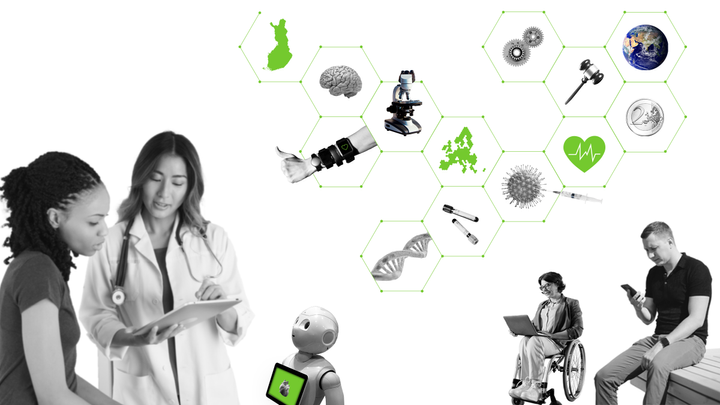Data offers a chance to save hundreds of millions of euros in social welfare and healthcare spending – Sitra's recommendations for improving efficiency

Public-sector indebtedness and growing labour shortages together with an ageing population are putting pressure on the financing of social welfare and healthcare services. One solution to ensure quality care, improve productivity and curb costs is to enable the efficient use of the data generated by social welfare and healthcare, says the Sitra study. Data generated in social welfare and healthcare services refers to health data, such as patient, medication and treatment data and data related to social services.
The implementation of the study’s recommendations would result in an estimated EUR 770 million in annual savings in social welfare and healthcare. This could free up 5,000 nurses and 1,300 doctors to provide care more efficiently and ease the increasing shortage of care professionals. The recommendations would also enable better and more efficient social welfare and healthcare services and promote the transition towards more personalised healthcare and disease prevention.
“The Finnish social welfare and healthcare system faces important choices in the upcoming government term. For understandable reasons, the first phase of the health and social services reform focused on administration and structures. The next phase of the reform should be done so that the focus shifts to data,” says Kristo Lehtonen, Director of the Fair data economy theme at Sitra.
Sitra recommends, among other things, that the quality of data generated in social welfare and healthcare should be improved, that people should have easier access to their personal data and that legislation should enable and oblige the use of artificial intelligence (AI) in the social welfare and healthcare sector. The study “The social welfare and healthcare system powered by data” was prepared by HUS’s former CIO Antti Larsio. Some 20 social welfare and healthcare experts were interviewed for the study.
Data remains siloed for many reasons and slows down care provision
Data generated by social welfare and healthcare circulates within organisations that provide social welfare and healthcare services and to some extent between service providers. Data is also shared within and between national data system services. The problem is that data does not move sufficiently well along the care pathway. If this could be changed, it would make care work more efficient.
There are numerous examples of data-related challenges: currently, patient health data does not move from healthcare centres to emergency services in sufficient scope or speed. Patient care data, such as ECG or EEG results, is not always passed on when care locations change. Patients cannot transmit their data themselves electronically to other care providers or their data systems.
Often, when experts from different fields work together, information is exchanged orally and entered manually into different systems. There are also challenges in multidisciplinary co-operation between social welfare and healthcare services and the education sector. The same information is currently recorded in many systems, such as social welfare client records, healthcare patient records and the student welfare systems run by municipalities.
Data and AI could help doctors, nurses and other professionals to work more efficiently and provide more personalised care.
“AI can be used in preventive care, such as identifying people belonging to risk groups. AI would also make it possible, for example, to record care procedures by dictation. At present, it takes staff even more time to make records than to examine patients,” says Sitra’s Kristo Lehtonen.
Social welfare and healthcare data should be able to move within well-being services counties, and when necessary between them, and in the long term from one EU country to another. Lehtonen points out that health data sharing has also been developed at European level.
“The EU’s goal is for health data would move smoothly from one country to another and between different patient information systems, as needed. Finland must prepare for this development.”
Savings could be achieved quickly
The ageing of the population and the low birth rate, combined with growing public sector indebtedness, require Finland to make a strong commitment to reform, including by decision-makers. According to Markus Kalliola, Project Director at Sitra, the quickest acting wellbeing services counties could tap into this savings potential already in this parliamentary term.
“Our recommendations do not call for more budget funds, so the wellbeing services counties should prioritise development actions in line with the recommendations. Doing things in a new way would free up development resources and labour,” says Kalliola.
Sitra’s study “The social welfare and healthcare system powered by data” will be published on 8 May 2023. With its study, Sitra wants to promote a national debate on how to make better use of social welfare and healthcare data, its opportunities it offers and prerequisites.
Sitra’s seven recommendations for reforming the use of social welfare and healthcare data
Sitra proposes the following measures to improve the mobility of data generated by social welfare and healthcare:
- People must have easier access to real-time data about themselves. People must have easy access their own social welfare and healthcare data, including in machine-readable format, so that it can be used more widely.
- The principle of “collect and record easily once, use often” should be introduced. Data systems must be built so that immutable data about an individual is collected and recorded only once and is always available where it is needed.
- The quality of social welfare and healthcare data must be improved. Data must be sufficiently comprehensive and understandable to the user. The quality of data must be ensured from when it is created to its storage, transmission and reception. Common quality assurance mechanisms are needed.
- Individual-centric, international data models must be implemented. Consistent data models are needed for both care and research. A common model would allow for the direct transfer of social welfare and healthcare data from one service provider to another if access rights allow. The common model would also pave the way for the future exchange of health data in Europe.
- Legislation should enable the use of AI and make it mandatory. AI is already used, for example, in analysing X-ray images. Its use must also be made possible in preventive care, the identification of risk groups and the analysis of patient groups. The use of AI would streamline quality care and reduces costs, ensure staff sufficiency and improve people’s well-being.
- The national steering model needs to be reformed. The steering structure and provision responsibilities of national data service systems need to be clarified and the services and costs of the wellbeing services counties harmonised.
- Funding should be directed towards implementing the recommendations. The Ministry of Social Affairs and Health guides the organisation and delivery of social welfare and healthcare services. The funding granted by the Ministry to social welfare and healthcare service providers, the Finnish Institute of Health and Welfare and national data system services should be directed towards improving data quality, introducing a common data model and technical infrastructure, thus ensuring interoperability and data mobility. The wellbeing services counties should draw up a roadmap for implementing the recommendations.
Further information:
Publication in Finnish (incl. summary in English):
Datasta voimaa sote-järjestelmään – Sote-dataa hyödyntämällä parempaa hoitoa ja kustannussäästöjä
Kristo Lehtonen, Director, Fair data economy, Sitra
kristo.lehtonen@sitra.fi, tel. +358 294 618 525
Markus Kalliola, Project Director, Health Data 2030 -project, Sitra
markus.kalliola@sitra.fi, tel. +358 294 618 432
Johanna Kippo, Specialist, Communication, Sitra
johanna.kippo@sitra.fi, tel. +358 294 618 220
Keywords
Images

About Sitra
Sitra is a future fund that collaborates with partners from different sectors to research, trial and implement bold new ideas that shape the future. Our aim is a Finland that succeeds as a pioneer in sustainable well-being.
Subscribe to releases from Sitra
Subscribe to all the latest releases from Sitra by registering your e-mail address below. You can unsubscribe at any time.
Latest releases from Sitra
Medieanalys: USA:s helomvändning i säkerhetspolitiken överraskade EU som ger ett svagt och splittrat intryck9.5.2025 01:00:00 EEST | Pressmeddelande
Politikerna efterlyser för närvarande europeiska säkerhetslösningar och en upprustning av Europa. Bara för ett år sedan, 2024, såg situationen helt annorlunda ut, och EU hade ingen större koppling till säkerhetsfrågor i den offentliga säkerhetsdebatten i Finland, Sverige, Tyskland och Italien. Det framgår av Sitras medieanalys där man har undersökt den journalistik som fått mest synlighet i länderna i fråga.
Media-analyysi: USA:n turvallisuuspoliittinen täyskäännös yllätti heikolta ja hajanaiselta näyttävän EU:n9.5.2025 01:00:00 EEST | Tiedote
Tällä hetkellä poliitikkojen puheissa peräänkuulutetaan eurooppalaisia turvallisuusratkaisuja ja Euroopan aseistamista. Näin ei kuitenkaan ollut vielä vuonna 2024, jolloin Suomen, Ruotsin, Saksan ja Italian julkisessa turvallisuuskeskustelussa EU ei juurikaan kytkeytynyt turvallisuusaiheisiin. Tämä käy ilmi Sitran teettämästä media-analyysista, jossa on tarkasteltu kyseisten maiden eniten näkyvyyttä saanutta journalismia.
Tidskrift från 2046: så kan framtiden se ut8.5.2025 07:08:20 EEST | Pressmeddelande
Tänk om våra tankar inte längre är privata? Tänk om mobiltelefoner förbjuds på offentliga platser? Tänk om äldre människor börjar begå brott för att komma in i fängelse för vård och gemenskap? Sitras tidskrift JOS* tar med läsaren in i framtiden där en rad svaga signaler har blivit vår vardag. Tidningens syfte är att skapa diskussioner om framtiden och stärka vår förmåga att leva i en tid av osäkerhet.
Tältäkö näyttää vuonna 2046? Sitran aikakauslehti haastaa ajatuksiamme tulevaisuudesta8.5.2025 07:08:20 EEST | Tiedote
Mitä jos ajatuksemme eivät ole enää yksityisiä? Mitä jos kännykät kielletään julkisilta paikoilla? Mitä jos vanhukset alkavat tehdä rikoksia päästäkseen hoivan ja yhteisön äärelle vankilaan? Sitran julkaisema JOS*-aikakauslehti vie lukijan tulevaisuuteen, jossa joukosta heikkoja signaaleja on tullut arkipäivää. Kertaluonteisen lehden tarkoituksena on herättää tulevaisuuskeskustelua ja vahvistaa kykyämme elää epävarmuuden ajassa.
A magazine from 2046: A glimpse into possible futures8.5.2025 07:08:20 EEST | Press release
What if our thoughts are no longer private? What if mobile phones were banned from public places? What if the elderly start committing crimes to get into the care and community of prison? Sitra’s new JOS* (“WHAT IF”) magazine transports readers to a future where some of today’s weak signals have become everyday realities. The aim of the publication is to spark discussion about the future and strengthen our ability to navigate uncertainty.
In our pressroom you can read all our latest releases, find our press contacts, images, documents and other relevant information about us.
Visit our pressroom
